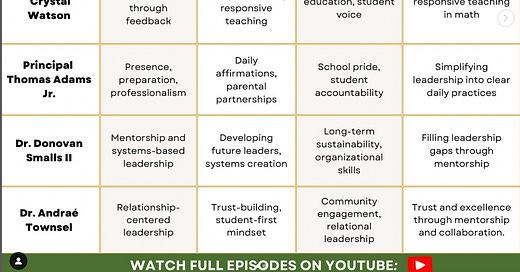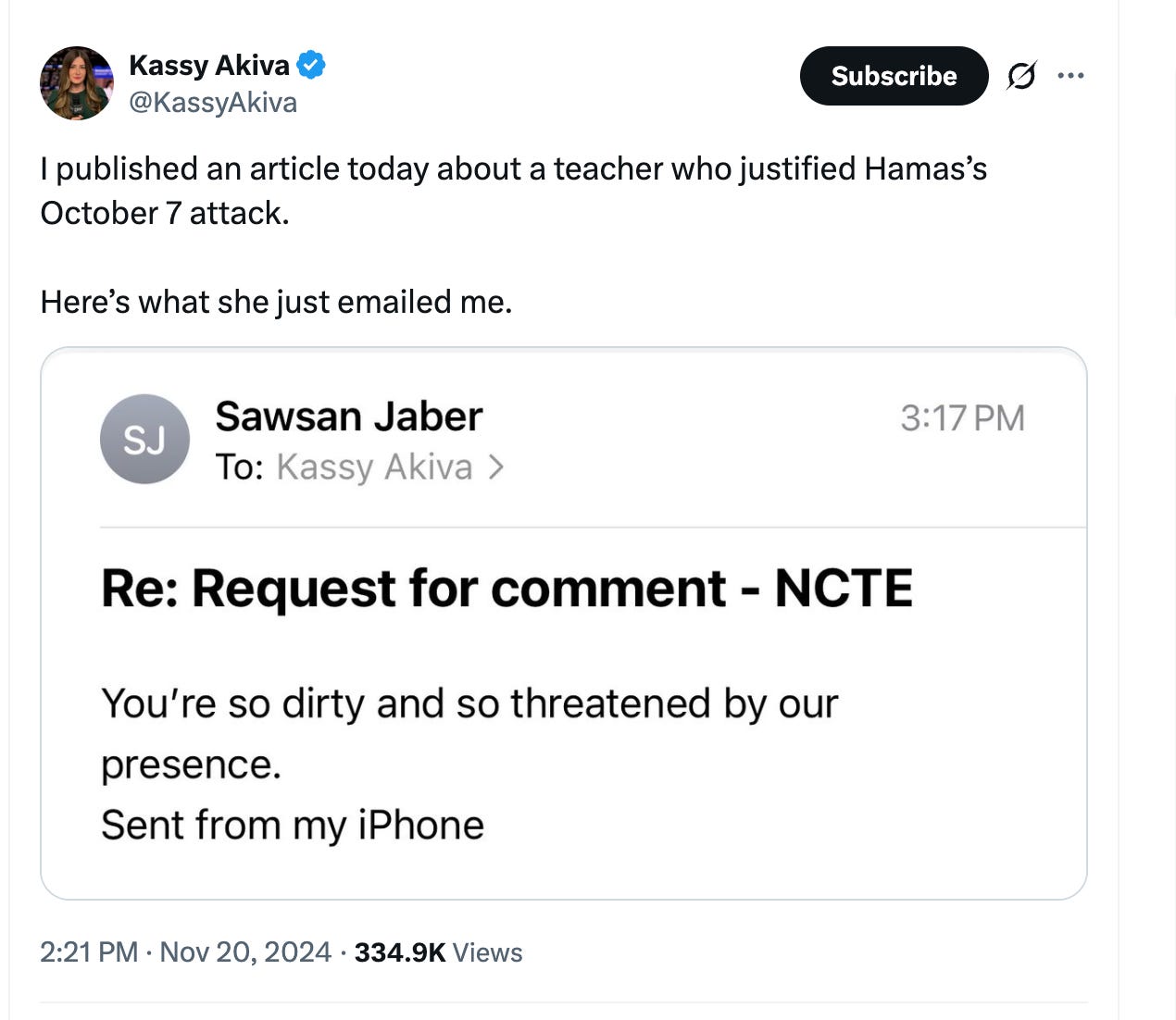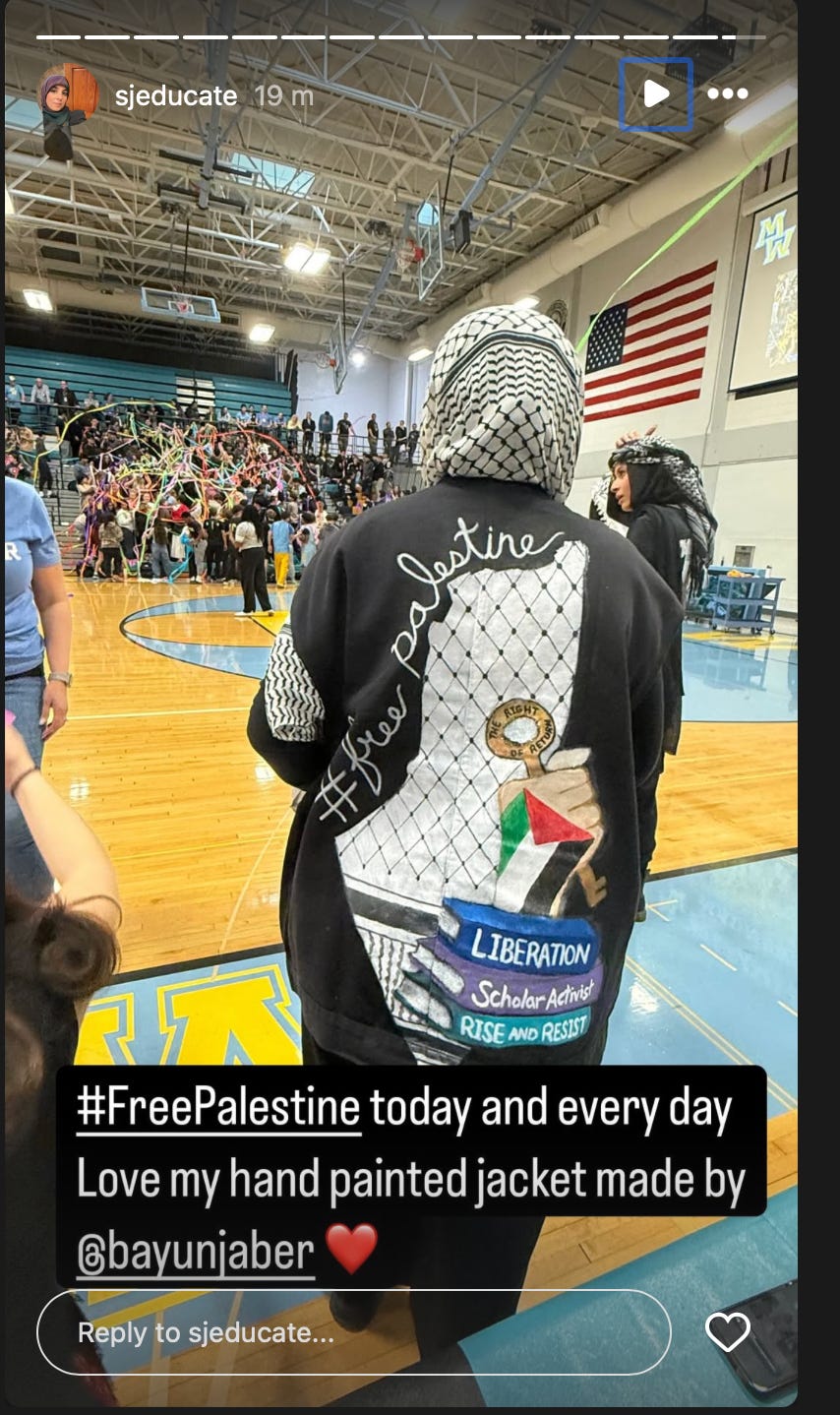"...share resources with teachers that allow us to do the work that would normally be labeled DEI, in a way that is maybe more subversive or that... wouldn't set off any alarm bells."
Sawsan Jaber and friends discuss a "pedagogy of voice" - a new way to approach teaching.
The title of this post is a quote from Jennifer Gonzalez, editor in chief of “Cult of Pedagogy”, a website for teachers where she provides resources (like the Zinn Education Project and the 1619 Project) and teaching tips, and self-described “former teacher of teachers” at a university.
It was said during a webinar for the book launch of “Pedagogies of Voice:Street Data and the Path to Student Agency” by Shane Shafir, Crystal M. Watson, Marlo Bagsik and Sawsan Jaber. Gonzalez suggests the book is a great way to bring DEI into the classroom.
Here is the preface to the book:
Dear Reader,
This is an invitation. An invitation to exercise our power as educators. An invitation to center our humanity and awaken student voice rather than uphold oppressive systems that we know are harmful. An invitation to dream and imagine schools that liberate us to do right by our students and society at large while reigniting the spark that led us into this profession in the first place. We won’t pretend to ignore the decades of misguided policies and practices that have served to silence the voices of students and educators alike. At the same time, our desire to write this book is fueled by our belief that such barriers can and must be dismantled: we simply can’t live like this any longer. Our students deserve better and we know better to than to continue with “business as usual.” We need to remember that we have the agency to transform our classrooms and the systems we work in.
The four of us crafting this book see you, beloved reader. We acknowledge the work you do every day and the courage required to keep showing up in these complex times for education. We also affirm the part of you that is seeking, always seeking, to transform your practice—the part that brought you to us. We four have ancestral roots that stretch across the globe, and we come to you braiding together legacies of truth-telling, justice, and hope. Our own voices have been hard-won. Each of us has struggled to articulate stories of possibility—counter-narratives that nurture pedagogies of student voice—while simultaneously honoring who we are and where we come from.
The book is designed to help K-12 teachers. It is described:
“Introducing four domains of agency–Identity, Belonging, Inquiry, and Efficacy–this book presents a framework for creating schools that affirm every learner while dismantling systems of oppression.”
Shane Shafir offers professional development services including workshops and “equity leadership retreats” for teachers and school districts.
Marlo Bagsik teaches 11th grade English in San Mateo Union High School District.He is on the Instructional Lead Team to make sure that “instructional practices” in the District meet its goal of becoming an “antiracist” school district.
Since 2013, Marlo Bagsik has dedicated his career to advancing equity and social justice in education, with a focus on ensuring the highest quality education for historically oppressed groups. His work, rooted in English language arts, extends to restorative justice, trauma-informed care, multi-tiered systems of support (MTSS), and adult learning. With degrees from UC Berkeley and USC, Marlo has been a leader in transforming schools into antiracist, inclusive environments. Currently, as the district professional learning coordinator in the SF Bay Area, Marlo continues to champion systemic change that honors the dignity and humanity of every student and educator. He’s a forever educator, facilitator, equity strategist, author, and speaker.
Crystal M. Watson is principal of Rockdale Academy in the Cincinnati Public Schools. She also teaches math which she approaches from an “anti-racist” perspective.
Crystal M. Watson is an innovative, passionate, and authentic mathematics educator and life-long learner who you can count on to always ask “What do the students think?” Her work is centered around providing space for voice and identity development in order for everyone, particularly those most marginalized, to experience high-quality, deep, and personal mathematics. Crystal has worked alongside other scholars to develop culturally responsive, reflective, and/or anti-racist curricular resources that center young people in every lesson. You might catch her at both local and national conferences, on podcasts, developing and leading professional development sessions, or having conversations about how we are cultivating youth-centered spaces.
And then, of course, there’s Sawsan Jaber. Jaber, as regular readers of the Substack will know, was the Department Chair of English at Maine West High School. She has a penchant for using her Maine West credentials when appearing at conventions held by extremist groups under investigation for terror financing. Jaber also believes Hamas are not a terrorist organization but are instead “legitimate resistance.” - which might explain why she would publicly mourn Yahya Sinwar.
And Jaber certainly has a way with words when corresponding with Jewish journalists:
Of course, none of that made the bio given her by the book’s publishers:
Dr. Sawsan Jaber is a global educator, author, presenter, equity strategist, curriculum designer, and keynote speaker of 20+ years. She is currently a high school English department chair and a district equity leader. Sawsan founded Education Unfiltered Consulting and works with schools nationally and internationally. She completed her PhD in curriculum and instruction with a focus on inclusion and belonging of students from marginalized communities. Sawsan was nominated for Illinois Teacher of the Year for 2023, awarded the Cook County Teacher of the year in 2023, IDEA Teacher of the Year in 2022, and is an ISTE 20 to Watch Awardee for 2023.
Here’s Jaber wearing a “free Palestine” jacket and Keffiyah to a Maine West event.
Indeed, Jaber, along with her fellow authors, is described in the book launch as a “wise and compassionate” educator.
The book launch begins with the authors introducing themselves. Watson says she writes for an “unwavering and unapologetic pursuit of liberation.” Marlo Bagsik describes himself as a “fierce queer Filipino-American educator who like many is at a very complex intersection, fighting for a more just educational system and for the liberation of all.”
Sawsan Jaber begins her introduction “I have all the feels right now” and introduces herself as the granddaughter of “Nakba survivors.” She describes herself as a “scholar activist” whose role is to “sow the seeds of justice in the next generation” and “create a future that honors liberation.”
Safir describes herself as a “work in progress” who is “striving to decolonize my writing, my work, my leadership.” Safir then goes on to talk about Gaza.
And then they go on to describe the contents of the book. Here is a portion of that discussion:
Jaber and her authors talk about the importance of having students understand that their teachers love them.
They talk about the importance of ‘story telling” in the classroom so that students can “own their stories” - and this must come from “empathy interviews” where teachers will listen to students more than speak in the classroom in order to “gather a narrative” and get to know their students “beyond the surface.” Teachers must “get to know students very deeply” to create “instructional experiences” for them that “are rooted in who they are.”
The credo for the “belonging” section of the book is to let students know that they “are seen and loved” in the classroom.
Call me old-fashioned, but as a student, I didn’t want my teachers to love me or know me deeply. I wanted them to teach me. For love and belonging, I had my family. I think boundaries are important. But maybe that’s just me.
Safir tells a story about a bike-ride she shared with her son where they discussed politics and the state of the world. She uses this story to illustrate that children are capable of discussing serious topics. But she misses the point here - this is a mother having the discussion with her son. Not a teacher imposing a viewpoint or bringing things into the classroom that don’t belong. It is absolutely wonderful that she has this open relationship with her child. I’d hope that all parents are able to have such open discussions with their children - at a time of their choosing. And that together they can help the child develop a moral and intellectual framework by which to live. That is the role of a parent. Not a teacher.
This book launch had everything - land acknowledgements, Gaza, identity politics in Math, education as a tool of liberation, and the collapse of boundaries in the role of teacher and student. Contrary to what Gonzalez said, alarm bells are definitely ringing.








A good example of how institutional capture by an extreme ideology happens. Note the inverted language, always a harbinger of post modernism in action requiring linguistic cover: the use of the term 'tolerance' means intolerance, diversity means uniformity, and so on. The classroom is being intentionally inverted from education to indoctrination. This is the toxic rot at the heart of Critical Theory and these activists are using schools to create a supply of naïve activists - our children - to be manipulated for their ideological purpose. None of them care about the children they purport to care about when their imported ideological activism outweighs the children's best interests. That's why all should at the very least be fired for breaching their professional ethical standards.